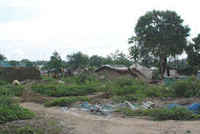SUDAN: Thousands homeless as shelters demolished in Juba
JUBA, 26 May 2009 (IRIN) - The large-scale demolition of poor housing in the Southern capital, which has left thousands homeless, was inconsistent with Southern Sudanese law and international human rights standards, the UN said.
"More than 30,000 people, many of them internally displaced, have been left homeless and are living in poor sanitary conditions with all the health and environmental risks this entails," the UN Mission in Sudan (UNMIS) said in a statement on 25 May.
International standards include reasonable prior notification and the possibility for the affected to challenge the decision. They also include provision of alternative land and compensation.
"Most of these standards recognised in Southern Sudan’s laws have not been met," UNMIS said. "With the rainy season approaching, the UN is worried that there may be a sharp deterioration in the living conditions of these populations."
The forced demolition of several small settlements in the Southern capital has been going on for four months, with bulldozers - supported by large numbers of armed police and soldiers - knocking flat thatched or tin shelters.
There was no immediate comment from the Central Equatoria State authorities that organised the exercise. They have, however, previously said they were only bulldozing houses built by squatters without permission.
Those affected said they had been left homeless with their livelihoods destroyed. "My shop was destroyed with my goods inside," said Selim Lado Carlos, who claimed he received no warning of the clearances. "Many people, not only me, lost their property. We lost what we were hoping could improve our lives."
Land ownership questions
Many of the tightly packed settlements were settled during Sudan’s long civil war. At that time, Juba was a garrison town for northern government forces, surrounded by the then southern rebels.
Other areas were settled more recently, as former refugees returned home to try to rebuild their lives with the end of Sudan’s civil war in 2005.
When they settled in the area during the chaotic years following the peace deal, locals said, there was little formal system to land ownership. Some said they had documents proving ownership, but were ignored by soldiers and forced to leave anyway.
Since the demolitions began, many of those affected have moved to Gudelle area on the very edge of Juba, some 6km from the town centre.
Lack of services
The original settlements had few services, but the new areas being settled lack any at all, the locals said. Many cannot afford the higher transport costs to reach their work in central Juba.
"Everywhere there are now houses being built in Gudelle, every day you see 10 new houses," said Emmanuel Ayon, who works in a school in the rapidly growing area.
"You hardly find a pit latrine - even at the school here – and yet the people still come because of the destruction."
Ayon helped run the Mother and Children NGO, which supported school construction in Juba’s suburbs. Its office was destroyed in the demolitions – despite Ayon claiming the group had legal papers.
In recent months, the number of pupils at the school in Gudelle has doubled. "We have received no support from the authorities," Ayon added. "Many people here are suffering very badly indeed."
Demanding that the demolitions stop, UNMIS criticised the lack of alternatives that authorities should have provided to those forced to move, warning of the humanitarian impact.
The authorities, it said, should "take prompt and necessary steps to provide alternative land, adequate housing, access to basic services, and compensation to the large numbers of families who have been suddenly uprooted from their homes in the past four months".


